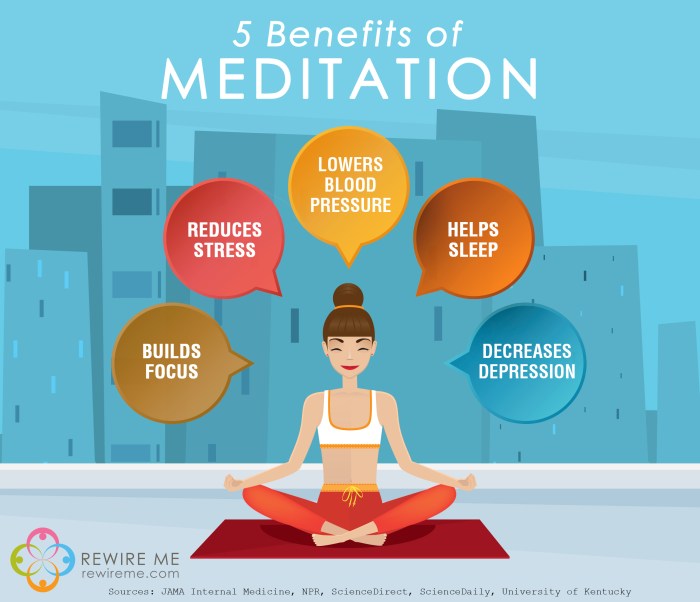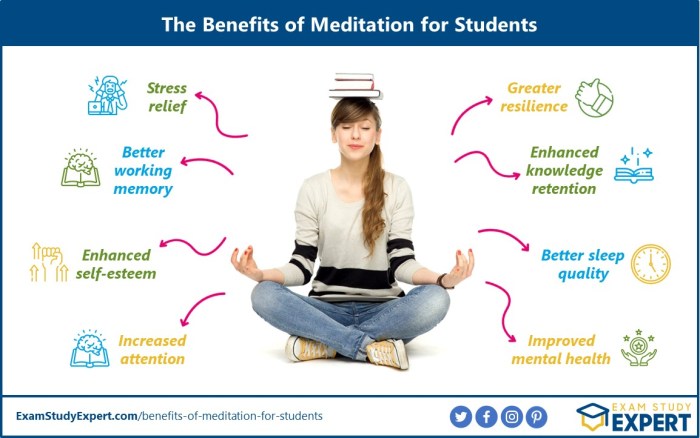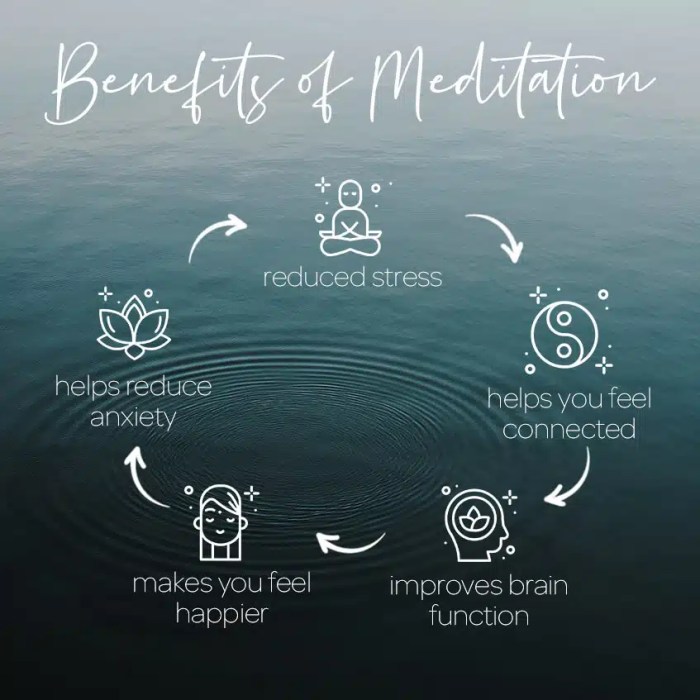With 8 Benefits of Using Meditation for Relaxation at the forefront, this paragraph opens a window to an amazing start and intrigue, inviting readers to embark on a storytelling journey filled with unexpected twists and insights.
Discover the transformative power of meditation and how it can positively impact your physical, mental, and emotional well-being.
Benefits of Meditation: 8 Benefits Of Using Meditation For Relaxation

Meditation is a practice that involves focusing the mind on a particular object, thought, or activity to achieve mental clarity and emotional calmness. It plays a significant role in relaxation by helping individuals manage stress, anxiety, and promote overall well-being.
Types of Meditation Practices
- Mindfulness Meditation: Involves focusing on the present moment without judgment, often by concentrating on breathing or bodily sensations.
- Transcendental Meditation: Involves repeating a mantra silently to promote a state of relaxed awareness.
- Loving-Kindness Meditation: Involves cultivating feelings of compassion and kindness towards oneself and others.
Reducing Stress and Anxiety
Meditation has been shown to have numerous benefits for reducing stress and anxiety. By practicing meditation regularly, individuals can lower cortisol levels (the stress hormone) in the body, improve mood, and enhance emotional well-being. Additionally, meditation can help individuals develop greater self-awareness and resilience in the face of challenging situations.
Physical Benefits

Meditation not only benefits the mind but also has a profound impact on the body. Here are some of the physical benefits of using meditation for relaxation:
Improved Sleep Quality
Meditation can help improve sleep quality by calming the mind and reducing stress and anxiety levels. By practicing meditation before bedtime, individuals can create a sense of relaxation that promotes better sleep patterns. This can lead to a more restful and rejuvenating night’s sleep, ultimately improving overall health and well-being.
Reduction of Inflammation
Chronic inflammation in the body can lead to various health issues, including heart disease, diabetes, and arthritis. Meditation has been shown to help reduce inflammation levels by lowering stress hormones and calming the nervous system. By incorporating meditation into a daily routine, individuals can potentially decrease inflammation in the body, leading to better overall health and a reduced risk of inflammatory-related diseases.
Mental Health Benefits
Meditation not only has physical benefits but also plays a significant role in improving mental health. The practice of mindfulness can have a profound impact on various aspects of mental well-being, including focus, concentration, and emotional stability.
Enhanced Focus and Concentration
- Meditation helps train the mind to focus on the present moment, reducing distractions and improving concentration.
- Regular practice of meditation can enhance cognitive function, memory, and overall mental clarity.
- By cultivating mindfulness through meditation, individuals can develop the ability to concentrate on tasks more effectively and sustain their attention for longer periods.
Emotional Well-being
- Mindfulness meditation can promote emotional regulation by increasing self-awareness and reducing reactivity to stressful situations.
- Through meditation, individuals can learn to observe their thoughts and emotions without judgment, leading to better emotional resilience and a greater sense of inner peace.
- Research has shown that meditation can reduce symptoms of anxiety, depression, and other mental health disorders, improving overall emotional well-being.
Spiritual Connection
Meditation is not only beneficial for physical and mental health but also plays a significant role in deepening one’s spiritual connection. By quieting the mind and focusing inward, individuals can explore their spirituality and connect with a higher power or sense of purpose.
Link Between Meditation and Personal Growth
- Meditation allows individuals to reflect on their values, beliefs, and goals, leading to personal growth and self-discovery.
- Through regular practice, individuals can cultivate qualities such as compassion, gratitude, and acceptance, which are essential for spiritual development.
- By connecting with their inner selves, individuals can gain clarity on their life’s purpose and direction, leading to a more meaningful and fulfilling existence.
Enhancing Sense of Purpose
- Meditation helps individuals tap into their intuition and inner wisdom, guiding them towards their true calling and purpose in life.
- By quieting external distractions and focusing inward, individuals can align with their spiritual values and aspirations, leading to a more purposeful and fulfilling life.
- Through meditation, individuals can experience a sense of interconnectedness with the universe, fostering a deeper understanding of their role in the world and their contribution to the greater good.
Improved Relationships

Meditation not only benefits individuals personally but also has a positive impact on their relationships with others. By cultivating mindfulness through regular meditation practice, individuals can enhance their communication skills, foster empathy, and build stronger connections with those around them.
Enhanced Communication Skills
Mindfulness, a key component of meditation, helps individuals become more present and attentive in their interactions with others. By improving focus and listening skills, meditation can enhance communication by allowing individuals to truly understand and respond to what others are saying, leading to clearer and more effective conversations.
Fostering Empathy and Compassion
Through meditation, individuals can develop a greater sense of empathy and compassion towards others. By practicing loving-kindness meditation, individuals can cultivate feelings of warmth and goodwill towards themselves and others, leading to a deeper understanding and connection with those around them. This increased empathy and compassion can strengthen relationships and promote a more harmonious and supportive environment.
Boosted Immune System
Meditation has been shown to have a positive impact on the immune system, leading to a stronger defense against illnesses and infections. The connection between relaxation and immune function is crucial, as stress and anxiety have been linked to a weakened immune response. By reducing stress levels through meditation, individuals can help support their immune system and overall well-being.
Studies Supporting the Impact of Meditation on Immunity
- Research published in the journal Psychosomatic Medicine found that participants who practiced mindfulness meditation showed an increase in antibodies compared to those who did not meditate, indicating a stronger immune response.
- A study conducted at the University of Wisconsin-Madison found that meditation can lead to changes in gene expression related to immune function, suggesting a direct link between meditation and immune system regulation.
- Another study published in the journal Brain, Behavior, and Immunity showed that mindfulness meditation can reduce markers of inflammation in the body, which are often associated with a compromised immune system.
Cognitive Benefits
Meditation not only has physical and mental health benefits but also plays a significant role in enhancing cognitive function. By incorporating meditation into your daily routine, you can experience improvements in memory, learning abilities, and decision-making skills.
Memory and Learning Abilities
- Regular meditation practice has been shown to enhance memory retention and recall. This is attributed to the way meditation promotes focus and concentration, which are essential for encoding and retrieving information.
- Studies have indicated that individuals who meditate regularly exhibit better cognitive flexibility, allowing them to adapt to new information and learn more effectively.
- Improved cognitive function through meditation can lead to better academic performance, increased productivity, and overall cognitive well-being.
Decision-Making Skills
- Meditation helps individuals cultivate mindfulness, which is the ability to be fully present and aware of their thoughts, emotions, and surroundings. This heightened awareness can lead to better decision-making by reducing impulsive reactions and promoting logical reasoning.
- By practicing mindfulness through meditation, individuals can gain clarity of thought, reduce cognitive biases, and make more informed choices in various aspects of their lives.
- Enhancing decision-making skills through meditation can contribute to better problem-solving abilities, increased self-control, and a greater sense of empowerment in decision-making processes.
Daily Practice Tips
Incorporating meditation into your daily routine can greatly enhance your overall well-being. Creating a peaceful meditation space at home and overcoming common obstacles can help you maintain a consistent practice.
Creating a Peaceful Meditation Space, 8 Benefits of Using Meditation for Relaxation
To create a peaceful meditation space at home, choose a quiet area free from distractions. Decorate it with items that bring you a sense of calm, such as candles, cushions, or plants. Keep the space clean and organized to promote relaxation and focus during your practice.
Overcoming Common Obstacles
- Avoid setting unrealistic expectations for your meditation practice. Start with short sessions and gradually increase the duration as you become more comfortable.
- Find a time of day that works best for you to meditate consistently. Whether it’s in the morning, during lunch break, or before bed, establish a routine that fits your schedule.
- If you find yourself easily distracted, try using guided meditation apps or calming music to help you stay focused during your practice.
- Remember that it’s normal to have wandering thoughts during meditation. Instead of getting frustrated, acknowledge the thoughts and gently refocus your attention on your breath or mantra.
- Stay committed to your practice even on days when you don’t feel like meditating. Consistency is key to experiencing the full benefits of meditation.
Final Summary

Embark on a journey towards a more relaxed and fulfilling life by incorporating meditation into your daily routine. Experience the multitude of benefits it offers and enhance your overall well-being today.